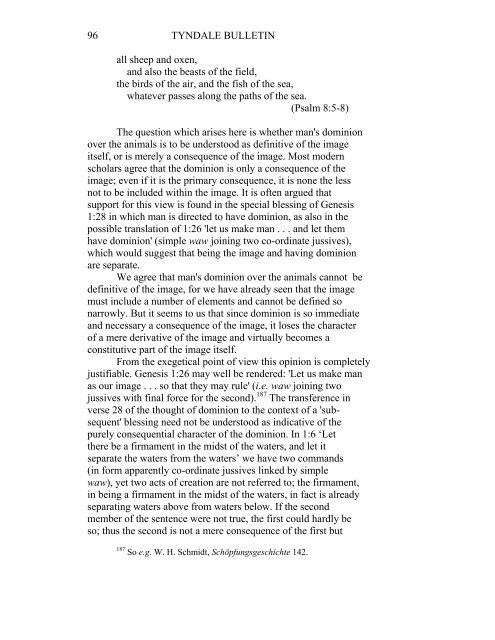THE IMAGE OF GOD IN MAN - Tyndale House
THE IMAGE OF GOD IN MAN - Tyndale House
THE IMAGE OF GOD IN MAN - Tyndale House
- TAGS
- tyndale
- tyndalehouse.com
You also want an ePaper? Increase the reach of your titles
YUMPU automatically turns print PDFs into web optimized ePapers that Google loves.
96 TYNDALE BULLET<strong>IN</strong><br />
all sheep and oxen,<br />
and also the beasts of the field,<br />
the birds of the air, and the fish of the sea,<br />
whatever passes along the paths of the sea.<br />
(Psalm 8:5-8)<br />
The question which arises here is whether man's dominion<br />
over the animals is to be understood as definitive of the image<br />
itself, or is merely a consequence of the image. Most modern<br />
scholars agree that the dominion is only a consequence of the<br />
image; even if it is the primary consequence, it is none the less<br />
not to be included within the image. It is often argued that<br />
support for this view is found in the special blessing of Genesis<br />
1:28 in which man is directed to have dominion, as also in the<br />
possible translation of 1:26 'let us make man . . . and let them<br />
have dominion' (simple waw joining two co-ordinate jussives),<br />
which would suggest that being the image and having dominion<br />
are separate.<br />
We agree that man's dominion over the animals cannot be<br />
definitive of the image, for we have already seen that the image<br />
must include a number of elements and cannot be defined so<br />
narrowly. But it seems to us that since dominion is so immediate<br />
and necessary a consequence of the image, it loses the character<br />
of a mere derivative of the image and virtually becomes a<br />
constitutive part of the image itself.<br />
From the exegetical point of view this opinion is completely<br />
justifiable. Genesis 1:26 may well be rendered: 'Let us make man<br />
as our image . . . so that they may rule' (i.e. waw joining two<br />
jussives with final force for the second). 187 The transference in<br />
verse 28 of the thought of dominion to the context of a 'sub-<br />
sequent' blessing need not be understood as indicative of the<br />
purely consequential character of the dominion. In 1:6 ‘Let<br />
there be a firmament in the midst of the waters, and let it<br />
separate the waters from the waters’ we have two commands<br />
(in form apparently co-ordinate jussives linked by simple<br />
waw), yet two acts of creation are not referred to; the firmament,<br />
in being a firmament in the midst of the waters, in fact is already<br />
separating waters above from waters below. If the second<br />
member of the sentence were not true, the first could hardly be<br />
so; thus the second is not a mere consequence of the first but<br />
187 So e.g. W. H. Schmidt, Schöpfungsgeschichte 142.

















